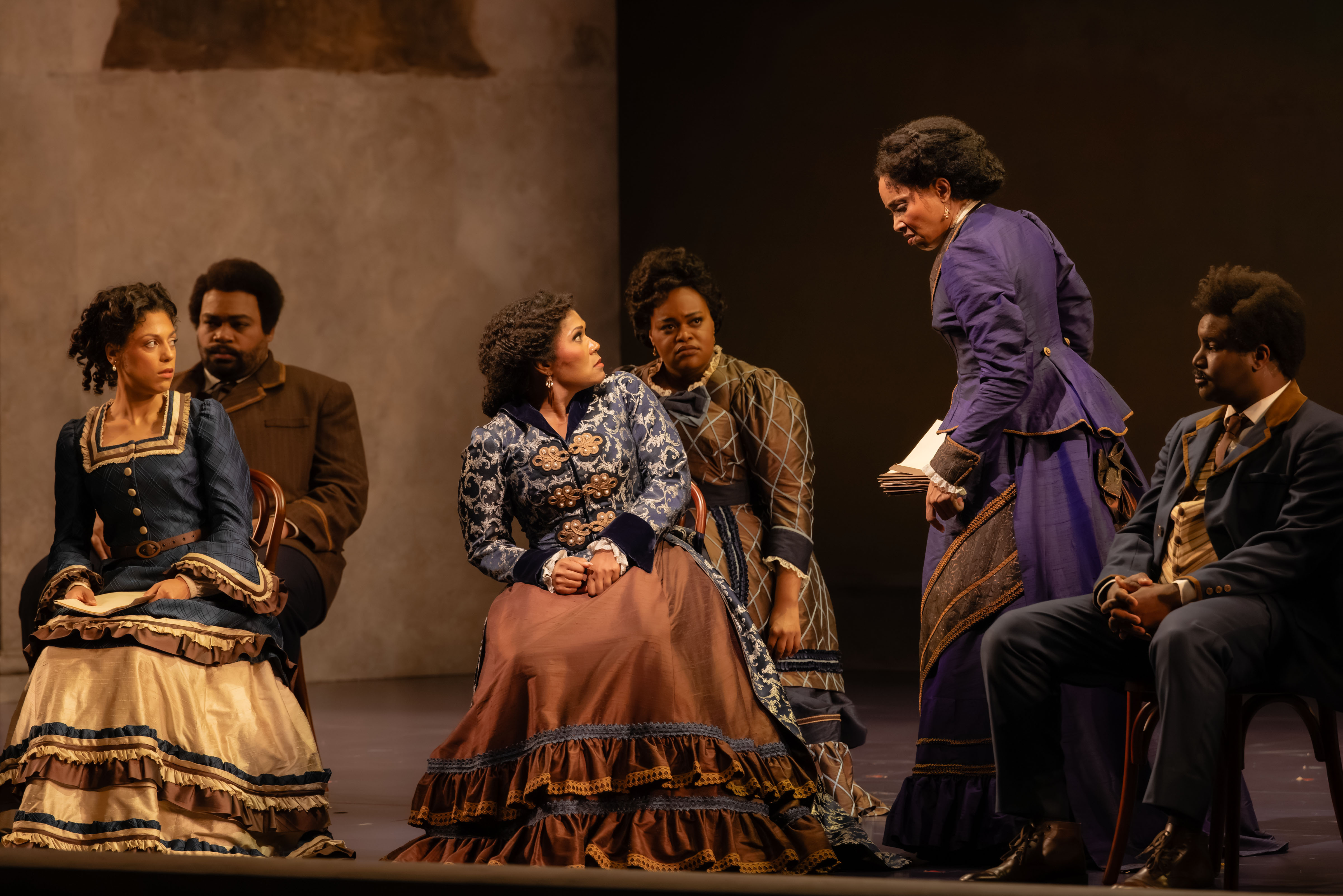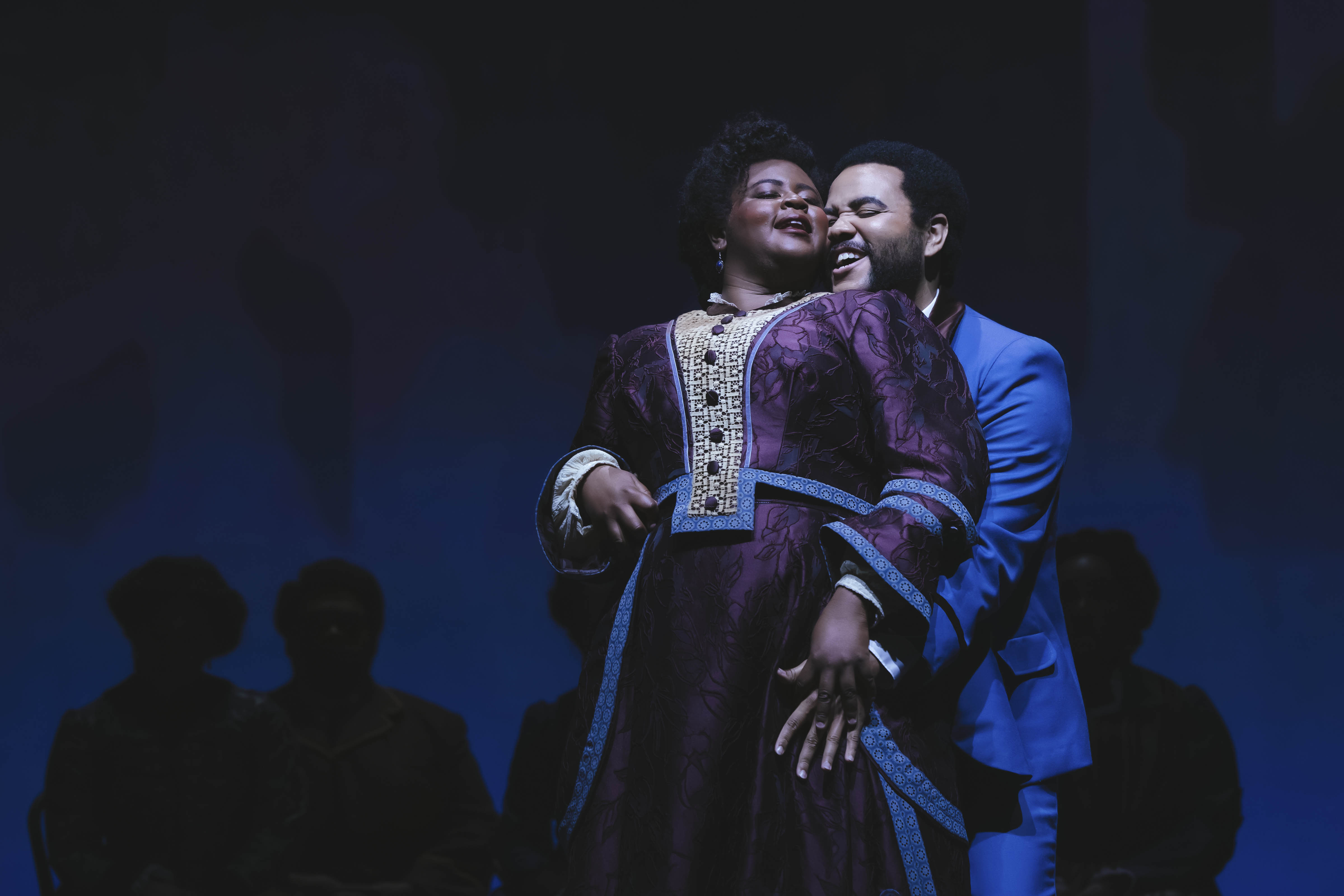Seattle Opera’s “Jubilee”: Reviving or Revising?
Review of Jubilee at Seattle Opera
Written by TeenTix Newsroom Writer REAGAN RICKER and edited by Teen Editorial Staff member RAIKA ROY CHOUDHURY

In theory, Tazewell Thompson’s performance of “Jubilee” at the Seattle Opera works. As the music swells, and the 13 opera singers dressed in 19th century outfits swarm the set, the audience prepares itself for a performance that honors these singers. It works—until it doesn’t.
The singers, of course, represent the Jubilee Singers of Fisk University. Founded to educate newly freed slaves, the university initially struggled to stay financially afloat as many of its attendees weren’t able to pay tuition. Enter the Fisk Jubilee singers. Originally a singing group of nine African American members (although Thompson’s version has 13), they traveled the world performing for figures like Queen Victoria and President Grant on their fundraising tours. Today, the Jubilees are not only credited with saving Fisk University from financial ruin, but also with the early popularization of African spirituals amongst white and northern audiences.
Covering over 40 African spirituals, such as “Wade in the Water,” “Swing Low, Sweet Chariot,” and “Go Down, Moses,” Seattle Opera’s “Jubilee” sets out to pay homage to the history of the Jubilee Fisk singers. But if it was this history they wanted to showcase, “Jubilee” shouldn’t have been an opera.

Associated with African slaves in the South and often paralleling biblical freedom with their own longing for freedom, African spirituals were typically reserved for churches. There, bodies and voices were the only instruments of music available: pounding feet kept the beat, hands kept rhythm, and voices, typically in a call-and-response format, sang out. So, you can imagine the dissonance between history and performance as I watched the singers glued to their chairs for the opening act, and drums used as a substitute for feet. On the Seattle Opera stage, there is no need for the traditional beat of spirituals; just below the stage rests a 52-piece orchestra ready to simulate the noises. But no amount of percussion, piccolo or cello can replicate the raw soul that human body parts have historically played in spirituals. Instead, the play’s transformation into opera feels ironic. In trying to make spirituals accessible through opera, the format ironically distances the audience from their authentic power and makes the history inaccessible. It left me wondering: if you truly wanted to honor the history of African spirituals’ popularization, wouldn’t it be better to bring them to an opera hall whilst retaining their original form? Indeed, even Tazwell’s original version of Jubilee—an acapella musical without accompaniments—would’ve functioned significantly better.
This is especially true when considering how little is known about the lives of the individual Jubilee Singers. To me, this is all the more reason to pay homage to the traditional manner in which these spirituals are sung. Instead, the opera risks fictionalizing both character and history.
Besides losing historical accuracy, stylistic choices in terms of casting and interpretation continued to steer the opera in a different direction. While Lisa Arrindell excelled in the versatility of her many roles, the choice to portray her as the white choral master George White was clearly lost on the audience. Her own racial background conflicted with the character, and her characters lacked distinction in costuming. With no way to separate her role as Jubilee singer Ella Sheppard from George White, the opera risked the confusion of the audience turning into misinterpretation as the racial context of White and the Singers’ interactions is lost. Much to my dismay, the artistic choices behind “Wade in the Water” also faced the same problem: its history is undeniably disrespected as it is used to convey the love affair of two Jubilee Singers, Frederick and Georgia. At one point, Georgia changes the lyrics from “Wade in the Water” to “Wade down in Georgia land.” This raunchy twist prompts laughter from the audience, and felt inappropriate considering the song’s historical usage as a message of escape on the Underground Railroad.

Nevertheless, my critiques are no fault of the performers. A seasoned veteran who won accolades for her performance in Jubilee’s first run in D.C, Aundi Maire Moore first won our laughter with her depiction of “prima-donna singer Maggie Porter”, and then later won our hearts with her operatic performance of "Deep River.” Martin Bakari’s lively energy as Greene Evans played into the hopeful ending of the Fisk Jubilee Singers wonderfully, and Lisa Arrindell was delightfully versatile in her multiple roles.
There was no note, no verse and no harmony sung on that stage that was nothing short of pure talent. Yet, perhaps it was because of the performers’ power that I was left with one question: how much more impactful would “Jubilee” have been, if its 19th century roots were honored?
Lead photo by Sunny Martini.
The TeenTix Newsroom is a group of teen writers led by the Teen Editorial Staff. For each review, Newsroom writers work individually with a teen editor to polish their writing for publication. The Teen Editorial Staff is made up of 6 teens who curate the review portion of the TeenTix blog. More information about the Teen Editorial Staff can be found HERE.
The TeenTix Press Corps promotes critical thinking, communication, and information literacy through criticism and journalism practice for teens. For more information about the Press Corps program see HERE.

